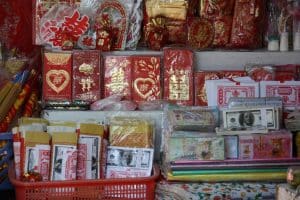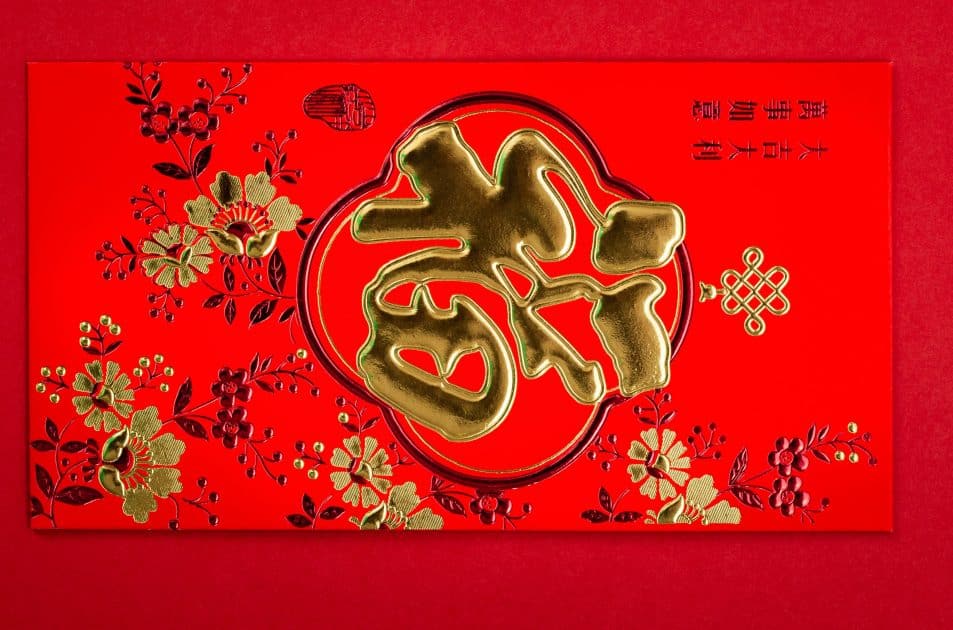Lucky Money!
When visiting Vietnam during the first few days of Tết (Lunar New Year) you may wonder why you see young children eagerly receiving small red envelopes from adults. The envelopes are not empty and there is something inside. It is ‘li xi’ (lucky money) or ‘tien mung tuoi’ (meaning happy age’ because Vietnamese people believe that you age one year at the passing of the New Year ). This custom of giving lucky money to children is very popular in Vietnam and other Asian countries.

The Story behind Lucky Money
As with many customs all over the world, there is an ancient story behind it and this one is about an ogre called Tuy. Once upon a time, all the evil spirits on Earth were trapped in a huge peach blossom tree (also a common symbol of Tết) in the Eastern Sea and the deities made sure they could not escape or harm anyone. However, on New Year’s Eve, the deities had to ascend to the Heavens and this allowed Tuy to escape. He would rub children on the head causing them to scream, wail and catch a fever. This meant that parents had to stay awake to guard the children.
At one time, some of these deities stopped in a small village and turned themselves into gold coins. The villagers covered these coins with red cloth and put them under the children’s’ pillows. When Tuy came to harass the children, he saw the sparkling gold coins and was driven away. The news of this spread far and wide and, from then until now, Vietnamese people have carried on the tradition of giving children money in small red envelopes for good luck.
What does it mean to Vietnamese people?
Every Vietnamese person, without exception, will have a tale to tell about ‘Li Xi’. For a child, perhaps the most enjoyable part of Tết is receiving the little red envelopes.
Most commonly ‘lucky money’ is given to children on the 1st to the 3rd day of the New Year, however, it can also be given later when an adult first meets a child in the New Year.
The little envelope is used to emphasize secrecy and to avoid children comparing the contents with each other. It is very bad form for the child to open the envelope in front of the gifting adult. The envelope is red and gold in color as this symbolizes good luck and prosperity. The more ‘li xi’ a child receives the more luck they are destined to have in the coming year.

Wishing Happy New Year
On the first morning of the New Year, families will meet and usually, the children and parents will visit the grandparents. They will wish the grandparents good luck for the year to come saying things such as:
- ‘Chuc Mung Nam Moi’ / ‘Happy New Year’,
- An Khang Tinh Vuong’ / ‘May you have good health’,
- ‘Van Su Nhu Y’ / ‘May all your dreams come true’,
- ‘Phat Tai, Phat Loc’ / ‘May you have lots of money and a successful career’
When meeting members of the wider family or friends, Vietnamese people will often offer the following generic wishes:
- Small kids = behave well / ‘be ngoan’ or eat well / ‘an nhieu vao’
- Kids = success at school / ‘hoc gioi’
- Single people = to get married /‘som lay chong/vo’
- Married people = to have kids / ‘co con’
- Old people = good health / ‘co suc khoe’
Once this formality is over, it is time to give and receive ‘li xi’ and for the children to welcome their new age. The amount of money in the envelope is not considered important, however, some people do like to use the 50,000vnd note as it is also red in color.
So, if you are in Vietnam over Tet and you know any young children, you should prepare some ‘li xi’ or “lucky money” to give to them as a token of your affection for them. You will delight your friends and be very popular 🙂














